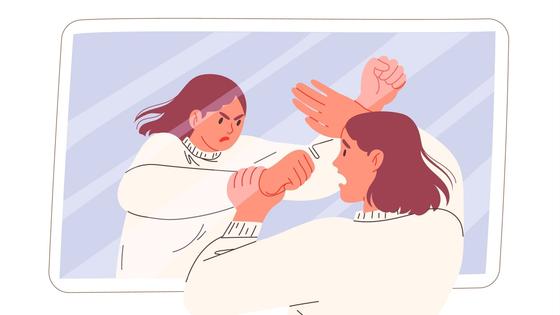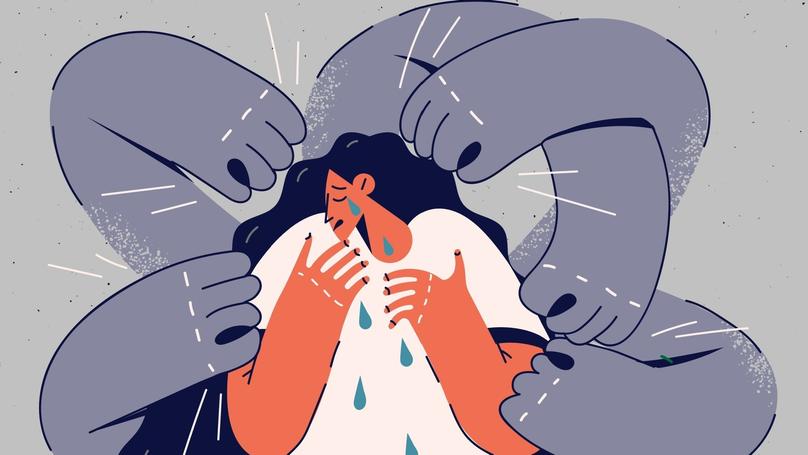Do no harm: what a manager needs to know about self-injury in the workplace
Self-injury is a problem that has long been taboo in society and is often kept hidden.

While it is commonly believed that only teenagers aged 12 to 16 years are prone to self-injury, this opinion is actually wrong. Adults may be better at concealing self-harming behaviours, and limited scientific research has been conducted among the adult population. However, about 80% of people have considered committing suicide at least once in their lives, and another 30-35% have made actual attempts.
As part of an effort to address self-harm, Self-Injury Awareness Day (SIAD) was established, which is celebrated annually on March 1. On this day, companies and public organisations aim to increase public awareness regarding self-injury, provide psychological support to those in need, and educate society on recognising signs of self-harm in their loved ones. You may have even noticed people wearing orange ribbons on their backpacks, writing the word LOVE on their hands, or drawing butterflies on their wrists during this day the week before and the following one. All of these symbols represent the ongoing battle against self-injury. Yet, they alone are inadequate in eliminating this problem.
As a boss, manager, or professional who values colleagues and aims to create a healthy office environment, it's essential to recognise self-harm and be prepared to counter it. Our article focuses on self-injury, covering its definition, workplace occurrences, identifying susceptible employees, and, crucially, strategies for addressing it.
What is self-injury, and why do people do it?

To start, some psychiatrists classify self-injury as a distinct condition yet simultaneously recognise it as a symptom of a more profound and serious mental disorder. Therefore, self-injury often accompanies depression and, consequently, has the potential to lead to suicidal thoughts and feelings (although initially, self-harm does not imply the desire to kill oneself). Self-harm typically manifests when an individual is solitary, and it often follows an uncontrolled or ritualistic pattern. Hence, why an individual may recognise what is transpiring yet remains incapable of stopping it. Abstaining from self-injury can lead to a significant surge in anxiety levels since self-harm is frequently intended to:
-
Relieve physical and mental stress
-
Distract from real problems that a person cannot solve
-
Manage apathy (which is also a sign of depression) and feel at least some emotions
-
Handle intense negative emotions such as guilt, anger, sadness, etc.
-
Punishishment for making a mistake.
Self-injury can arise from various other reasons as well. However, all these reasons can be attributed to an individual's inability to cope with stressful situations using rational and constructive methods. This not only represents a distortion of perception and mental disorders but also a lack of definite knowledge and experience to resolve internal problems.
Self-injury can take many forms and symptoms, including:
-
Leaving scratches on the skin using nails
-
Cutting yourself with scissors, a knife, and any other sharp object
-
Burns (cigarette burns, lit matches, hot objects, etc.)
-
Carving symbols or designs onto the skin
-
Self-inflicted blows, including strikes to the head, stomach, legs, and other body parts.
-
Skin tingling, accompanied by intense pinching or twisting.
-
Inserting objects, such as needles, beneath the skin.
Generally, individuals create these marks in discreet locations that clothing can easily conceal. Common areas include the arms above the wrist, the legs, or the hips. This makes it difficult to detect the signs of self-harm. However, it's essential to be mindful of reasons that elevate the risk of self-harm within the workplace.
Who is susceptible to self-injury, and how do you discover it?

Factors that increase the risk of having someone who self-harms among your colleagues include:
- Regular stress at work
Work stress is an entirely natural occurrence that affects everyone in the modern world. While this is true, it's essential to recognise that everyone copes with stress differently, and not everyone possesses constructive coping mechanisms. Some jobs involve a lot of stress, such as working in an ambulance, rescue services, etc. However, doing the same job can become stressful due to unforeseen situations in the job market, such as the behaviour of managers, communication with clients, and other unpleasant things. Therefore, an individual might not be adequately prepared to handle the demands associated with a specific profession or organisation. However, it's crucial to recognise that the alarm bells are not merely occasional or periodic stress but signify consistent and intense stress. In other words, if a stressful environment persists in the office nearly 24/7.
- Insufficient work-life balance and challenges in maintaining it.
Suppose they consistently work overtime or an employee voluntarily stays late to address additional work issues. In that case, this is a reason to take a closer look. Modern society forces us to combine many roles: having a family, a hobby, professional self-realisation, and a brilliant career. In this regard, women forced to combine work and motherhood experience a significant burden. According to statistics, it is female workers who are more prone to self-harm (approximately 70% of women to 30% of men).
- Conflicts or bullying in the workplace
Unfortunately, bullying is not limited to schools. Employees may also face colleague prejudice, deliberate isolation, passive aggression, or even outright insults in the workplace. The worse the relationships within the team, the greater the risk that one of the employees will experience mental disorders and, as a result, self-harm. Pay particular attention to those employees who are often the victims of others' anger, who are publicly criticised, and individuals who do not receive sufficient support in the workplace, both emotionally and in terms of training or mentoring.
- The existence of other mental health conditions or personal traumas.
Of course, it's possible that you won't be aware of this unless you have access to the employee's medical records. However, if the employee mentions something similar in the past during a conversation or you notice signs of any other disorders in them, it is worth remembering. Not all psychological issues are directly linked to self-harm or result in it. However, their presence can still elevate the risk-particularly in recent traumas like losing a loved one or financial difficulties.
- Isolation during COVID-19 and other crises
2020-2022 were terrible years for employees, as the market experienced enormous turbulence, and many had to change jobs and adjust to remote work urgently. The frequent lockdowns, social restrictions, and overall tension have significantly impacted the mental health of the population. Unfortunately, all of this has long-term consequences. Although the pandemic is officially over, some employees may still be experiencing the consequences. During a company's local crises, a similar situation arises, emphasising the need to prioritise the well-being of employees-both emotionally and morally.
What other ways can help you identify a person who is suffering from self-harm besides observing the factors listed above and your reaction to them? You can also explore several indicators of self-harm:
-
An indifferent attitude towards work, tasks performed, and activities within the company has appeared abruptly and has not been observed before.
-
Isolating oneself voluntarily, refusing to engage in dialogue or interaction with colleagues, and maintaining minimal social connections within the work environment.
-
Sudden mood swings, signs of low self-esteem, self-flagellation, and constant self-criticism.
-
Strange bruises or cuts on an employee's skin that are attributed to accidental work or home injuries, but they occur frequently.
-
Keeping themselves covered with clothing as much as possible, even in hot weather.
-
A significant number of old scars on the body and fresh ones.
-
The employee consistently keeps sharp and potentially harmful objects within reach, such as a stationary knife, even though they do not use it during work hours.
-
Explicit statements about feelings of helplessness, impotence, dark humour, or jokes with suicidal undertones.
If one of your employees exhibits one or more of these signs from the list or if you suspect they are involved in self-injury or at risk, take immediate action.
Lectera’s Online Courses by topic
Measures to counteract and prevent employee self-injury

What steps should you take if one of your employees or colleagues is (or maybe) involved in self-injury? It's important to realise that you cannot compel someone to seek psychiatric help or persuade them to take any specific action. We advise against initiating an open conversation about self-harm. It's essential to approach the situation with sensitivity and caution, adhering to the guidance and role of a supportive mentor.
That's why the methods of addressing a specific case of self-harm and prevention are closely related. They share common elements, which can be summarised as follows:
- Create a safe and supportive work environment
It is important to create a team climate where employees feel safe and are not afraid to speak up or ask for help. Fostering trust among colleagues and superiors is essential to achieving this. Regularly organise general entertainment events, facilitate interactions, and encourage open discussions about internal and work-related matters.
- Provide valuable information and resources for managing psychological issues.
Having an awareness of the significance of mental health, understanding self-harm issues, and promoting access to professional assistance not only mitigates the overall risk of mental disorders but also minimises the likelihood of conflicts and other factors leading to self-harm within a team. Consider displaying a poster in your office with essential reminders about mental health, helpline contacts, and self-care tips to prevent stress. Ensure that your employees have straightforward and accessible resources for psychological self-help. Additionally, fostering a general understanding of mental disorders, their manifestations, and appropriate actions is crucial.
- Provide a flexible work environment
Employees facing mental health challenges, including self-harm, could find benefits in flexible work schedules and the autonomy to set their own hours. This flexibility can help restore work-life balance, which, as we previously discussed, plays a significant role in mental health. Ideally, you should consult with each employee on how you can improve their comfort in the workplace.
- Monitor employee progress and needs
Establish a feedback channel where employees can submit their requests and complaints, including the ability to do so anonymously. Additionally, actively monitor the career development of your subordinates. Collaborate with them to plan their career paths, provide professional training opportunities, and foster initiatives and positive changes within the company. In summary, prioritise employees' professional growth to enhance their overall life satisfaction.
- Celebrate Self-Injury Awareness Day
This day is not widely acknowledged in all countries. Still, you can always introduce a holiday on March 1 at your company. Consider attending mental health seminars together, having open discussions, and psychological games on this day to foster team unity and encourage confidential conversations. Additionally, it will raise overall awareness about the importance of mental health and encourage individuals to seek the necessary support.
As a final option, if you've already attempted all these methods without achieving the desired outcome or if they're not feasible due to limited resources, consider having a straight conversation with the person directly. The key is to avoid sharing your suspicions, refraining from presenting arguments, and not using the topic of self-harm as an accusation. Kindly provide the contact details of a mental health professional you know, using a friendly tone and neutral language. Additionally, inform them about available self-help resources and support methods available to them. Remember that it is impossible to fight someone else's self-harm problems alone. You can help someone recognise their issue and encourage them to find a solution but avoid pressuring them into treatment or coercing them to reveal their inner thoughts. Ultimately, your main job as a manager or boss is to ensure your team is diversified, fair, and flexible, and that's worth a lot.
Share this with your friends via:
Latest News

A significant stage in the development of the alternative education system has begun in West Northamptonshire in the UK: the County Council is actively calling on parents, guardians, and trustees to participate in shaping the future of this key area.

Outwoods Primary School in Atherstone, Warwickshire, having experienced deep sadness after the loss of their famous cat, Silla, has found solace in a new pet – a Maine Coon named Aloysius O’Hara.

In modern universities, artificial intelligence, and in particular ChatGPT, is rapidly transforming from a controversial tool into a full-fledged student assistant.

An innovative educational project is gaining momentum in UK primary schools, aiming to change attitudes towards video games.

The Massachusetts Institute of Technology (MIT) presents MIT Learn – a revolutionary online platform that opens a “new front door” to access university knowledge and resources.












 Test: How Psychologically Mature Are You? Check Your Inner Foundation.
Test: How Psychologically Mature Are You? Check Your Inner Foundation.
 Test. Check Your Social Media Dependency Level!
Test. Check Your Social Media Dependency Level!
 Test: What Business is Right For You?
Test: What Business is Right For You?
 Test: How Prone Are You to Abusive Behavior as a Manager?
Test: How Prone Are You to Abusive Behavior as a Manager?
 Test. What superpower would you possess if you were a superhero?
Test. What superpower would you possess if you were a superhero?
 Test. What Should You Let Go of Before Winter Ends?
Test. What Should You Let Go of Before Winter Ends?
